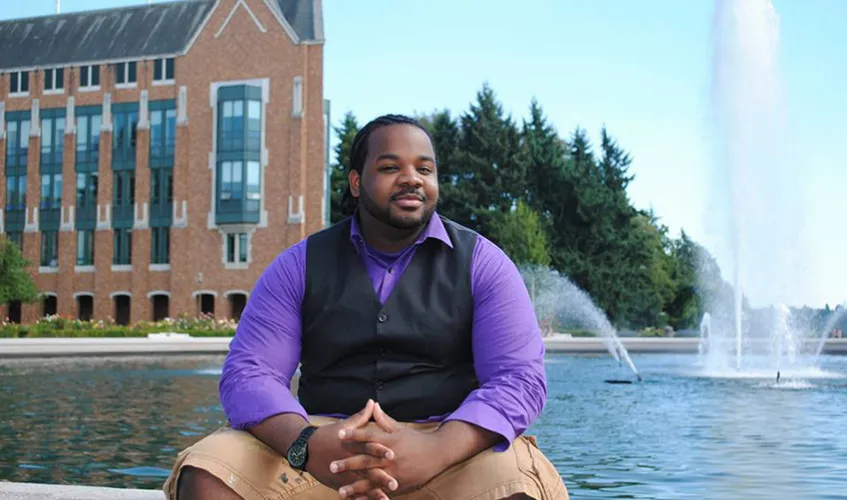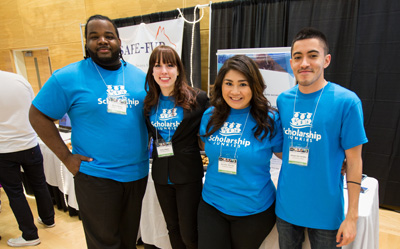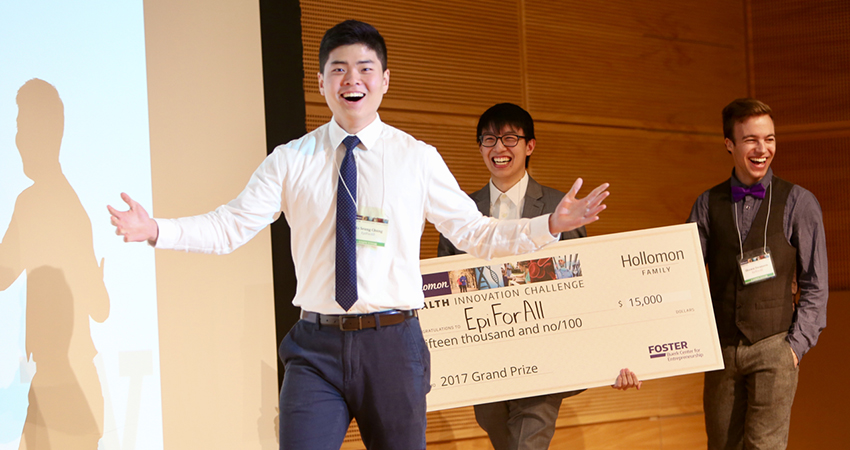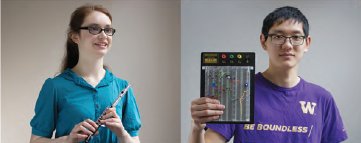May 2, 2017

Mechanical engineering senior David Coven has worn many hats since starting at the UW in 2012: He’s held research positions in cell biomechanics and materials science labs on campus as well as internships at Boeing and Tesla. He’s co-organized Dubhacks, the Pacific Northwest's largest hackathon, and is one of the UW Hyperloop team's directors. He also leads Scholarship Junkies, a nonprofit that helps students nationwide secure scholarships through essay writing advice, editing assistance and access to a comprehensive online scholarship database at no cost.
He recently sat down with the College of Engineering to discuss why he chose to study engineering and how he finds opportunities to practice compassion and generosity — two of his guiding values — every day on campus.
- What led you to study at the UW?
-
I grew up in Seattle’s Central District and went to Cleveland High School. I did pretty well in my classes despite some difficulties at home, the biggest among them being the periods of homelessness my family experienced. Even though I liked school, I was frequently absent from class because of homelessness. No kid wants to show up at school if they haven’t been able to shower for a few days, or sleep. It makes you feel really embarrassed and unworthy.
However, with support from friends and an amazing high school teacher, I was eventually able to secure housing, which allowed me to really focus on schoolwork and attend class regularly. I wanted to go to college but didn’t think it would be possible for me financially. But then I learned about Scholarship Junkies, and things began to change…
- How so?
-
 David Coven (left) with fellow Scholarship Junkies volunteers at a 2016 Buerk Center for Entrepreneurship event. Photo credit: Matt Hagen
David Coven (left) with fellow Scholarship Junkies volunteers at a 2016 Buerk Center for Entrepreneurship event. Photo credit: Matt HagenIn high school, I participated in Math Academy and Samson Lim, Scholarship Junkies’ founder, visited our class. Sam shared great insights about applying for scholarships, a process that can be really overwhelming for students. Thanks to his advice, and encouragement from my teachers, I applied for a bunch of UW scholarships and received the Costco Diversity Scholarship and the Washington State Diversity Scholarship. Because of them, I could attend the UW. I’ve been incredibly fortunate that I’ve been able to entirely fund my education thanks to scholarship support.
- Why did you decide to study engineering?
-
Honestly, because of Iron Man! Tony Stark was able to imagine things like Iron Man’s cool suit and devices and then use math, science and engineering to actualize them. When I realized that, as far as superhero abilities go, his were somewhat attainable, I set my sights on engineering.
- When did you start working with Scholarship Junkies?
-
I started volunteering with Scholarship Junkies shortly after I came to the UW. I loved that it gave me a space to actively participate in “paying it forward”: I was getting a UW education thanks to the help of others, and instead of feeling like I had to repay them, I became more interested in extending generosity to those who could use it. When Sam moved to New York for grad school in 2013, I was asked to take over leadership. How could I say no?
- How do you apply "paying it forward" to your life as an engineering student?
-
Every day I try to work on the world around me as much as I work on myself. Mechanical engineering has been a great fit for me because it intersects with so many areas. It’s helped me develop a strong set of skills in analysis, mechanical design and problem solving. I’m particularly interested in aerospace, renewable energy and sustainability, and in projects that have a large, meaningful impact. Because of mechanical engineering, I’ve interned with companies whose values align with mine: The Boeing Company, which is committed to making the skies safer, and Tesla, where advancements in renewable energy are revolutionizing transportation technologies.
Building community is also important to me. Most UW engineering undergrads start as pre-engineering students; they don’t have a home department until they apply and are — hopefully — accepted after their first year. So there’s not always a built-in structure or sense of collective identity for students from the start. But we often do our best work and are our best selves with a supportive community! I strive to find ways to connect with others, help people when I can and look to them for the support I need.
- What advice do you have for other students?
-
Don’t be afraid of failing, and know that it happens to all of us. When it happens to you — and it will — try to understand what you can learn from the experience. Ask for help and advice when you need it. People like to help! School — particularly engineering — can be very intense. It seems that a lot of students focus their time solely on coursework and getting the best grades. And when they don’t make the best grades, they’re crushed.
I wish more students took advantage of alternative and experiential learning opportunities. For me, being involved with UW Hyperloop, Dubhacks and Scholarship Junkies has been invaluable in this respect. And, if you can, put some time into researching and applying for scholarships! There’s so much scholarship money out there that goes ungifted every year — it’s pretty amazing.

Engineering students receive UW Presidential medals
Undergraduates Hannah Werbel and Evan Wang have received medals for academic achievement and extra-curricular involvement from UW President Ana Mari Cauce. These medals are awarded annually to three outstanding students across campus.
Werbel, who is majoring in computer science, enjoys teaching and finding practical applications for what she is studying in class. She is currently a teaching assistant for a computer programming class. Outside of academics, she plays piccolo in the marching band and basketball pep bands. Being legally blind, she is dedicated to increasing accessibility for other blind students. Werbel is president of the Washington Association of Blind Students and works for DO-IT (Disabilities, Opportunities, Internetworking and Technology), where she frequently attends panels about disability in the technological fields.

"I love to learn and have always aspired to make the most out of every opportunity I have to gain new knowledge, both inside and outside of the classroom," she said. "This award validates all of the hard work and effort I’ve put into my studies."
An electrical engineering senior, Wang’s drive to better understand the natural world led to a fascination with learning how things work at the atomic level. Over time, this gave way to learning the math and physics involved in reactions, and led him to study electrical engineering. Wang has been working with EE professor M.P. Anantram to model properties of devices that may one day be able to serve as faster, smaller and inexpensive memory sources in computers. Outside of the lab, he enjoys playing the French horn. Last year, he went on tour to China with the UW Wind Ensemble.
"Receiving this award has helped me realize that my research and my accomplishments can make an impact," Wang said.
Engineering student teams win big at 2017 UW Innovation Challenges
Engineering student teams swept this year’s Hollomon Health Innovation Challenge (HIC) and placed highly in the Alaska Airlines Environmental Innovation Challenge (EIC). Held in March, these events provided interdisciplinary student teams the opportunity to solve pressing issues affecting the environment and in healthcare.
Teams pitched their innovations, demonstrated their prototypes and fielded questions. They were judged on their pitch, prototype demonstration and ability to articulate the potential for impact. At the HIC, UW teams including students from mechanical engineering and bioengineering won first, second and third place for the following devices:
- First place: EpiForAll, an affordable emergency epinephrine auto injector used to treat anaphylaxis, a potentially life-threatening allergic reaction.
- Second place: BWB Anesthesia, an electricityfree portable anesthetic device that aims to improve access to inhaled anesthesia in lowresource settings.
- Third place: PlayGait, an adjustable, affordable, non-electric exoskeleton to support in-home walking practice for kids with neuromuscular disorders.
UW teams led by electrical engineering and chemical engineering students placed in the EIC with these projects:
- Second place: Airy, a battery-free, wireless home security solution that uses sensors mounted on doors or windows to harvest energy.
- Clean energy prize: Membrion, which provides low-cost, high-performance membranes for advanced batteries, fuel cells and reverse osmosis water desalination applications.
Engineering students named to the 2017 “Husky 100”
The Husky 100 recognizes 100 UW undergraduate and graduate students from Bothell, Seattle and Tacoma in all areas of study who are making the most of their time at the UW. Sixteen engineering students have been named to 2017’s Husky 100 cohort:
Camille Birch, Bioengineering, Computer Science
Esther Chang, Civil Engineering
Shivani K. Gupta, Bioengineering
Kelsie Haakenson, Computer Science, History
Mayoore Jaiswal, Electrical Engineering
Kevin Lybarger, Electrical Engineering
David McIntyre, Bioengineering
Trevor Renken, Civil Engineering
Kayla Sprenger, Chemical Engineering
Holly Sullivan, Chemical Engineering
Gabriella Tosado, Chemical Engineering
Connor Tsuchida, Bioengineering
Jonathan Tsui, Bioengineering, Molecular Medicine
Bradley Wachter, Mechanical Engineering
Grant Williamson, Molecular Engineering
Jessica Zistatsis, Mechanical EngineeringLearn more about the Husky 100 students and program »